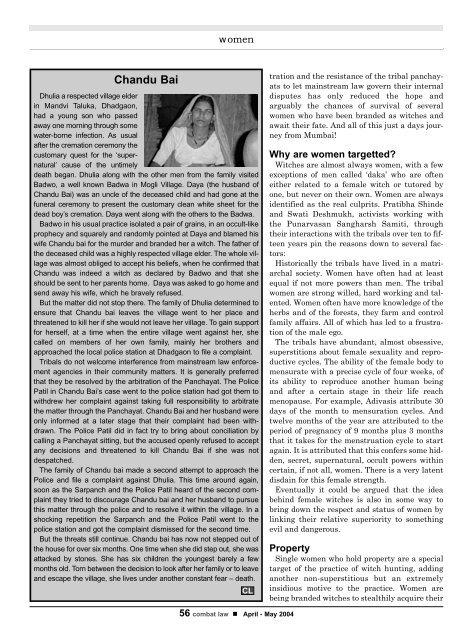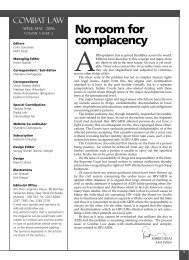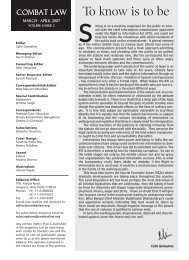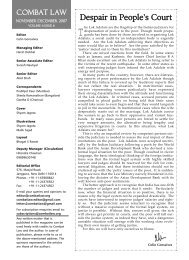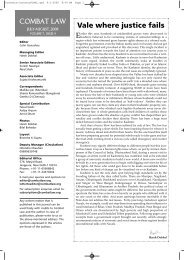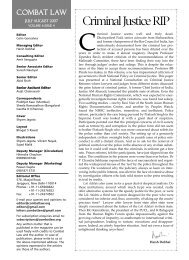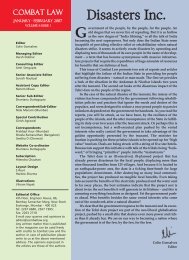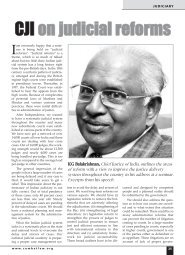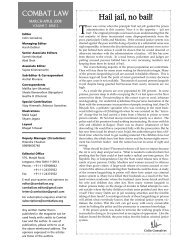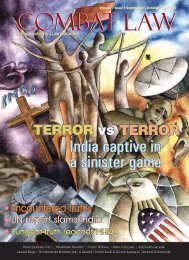PDF, 1.1MB - Combat Law
PDF, 1.1MB - Combat Law
PDF, 1.1MB - Combat Law
Create successful ePaper yourself
Turn your PDF publications into a flip-book with our unique Google optimized e-Paper software.
womenChandu BaiDhulia a respected village elderin Mandvi Taluka, Dhadgaon,had a young son who passedaway one morning through somewater-borne infection. As usualafter the cremation ceremony thecustomary quest for the ‘supernatural’cause of the untimelydeath began. Dhulia along with the other men from the family visitedBadwo, a well known Badwa in Mogli Village. Daya (the husband ofChandu Bai) was an uncle of the deceased child and had gone at thefuneral ceremony to present the customary clean white sheet for thedead boy’s cremation. Daya went along with the others to the Badwa.Badwo in his usual practice isolated a pair of grains, in an occult-likeprophecy and squarely and randomly pointed at Daya and blamed hiswife Chandu bai for the murder and branded her a witch. The father ofthe deceased child was a highly respected village elder. The whole villagewas almost obliged to accept his beliefs, when he confirmed thatChandu was indeed a witch as declared by Badwo and that sheshould be sent to her parents home. Daya was asked to go home andsend away his wife, which he bravely refused.But the matter did not stop there. The family of Dhulia determined toensure that Chandu bai leaves the village went to her place andthreatened to kill her if she would not leave her village. To gain supportfor herself, at a time when the entire village went against her, shecalled on members of her own family, mainly her brothers andapproached the local police station at Dhadgaon to file a complaint.Tribals do not welcome interference from mainstream law enforcementagencies in their community matters. It is generally preferredthat they be resolved by the arbitration of the Panchayat. The PolicePatil in Chandu Bai’s case went to the police station had got them towithdrew her complaint against taking full responsibility to arbitratethe matter through the Panchayat. Chandu Bai and her husband wereonly informed at a later stage that their complaint had been withdrawn.The Police Patil did in fact try to bring about conciliation bycalling a Panchayat sitting, but the accused openly refused to acceptany decisions and threatened to kill Chandu Bai if she was notdespatched.The family of Chandu bai made a second attempt to approach thePolice and file a complaint against Dhulia. This time around again,soon as the Sarpanch and the Police Patil heard of the second complaintthey tried to discourage Chandu bai and her husband to pursuethis matter through the police and to resolve it within the village. In ashocking repetition the Sarpanch and the Police Patil went to thepolice station and got the complaint dismissed for the second time.But the threats still continue. Chandu bai has now not stepped out ofthe house for over six months. One time when she did step out, she wasattacked by stones. She has six children the youngest barely a fewmonths old. Torn between the decision to look after her family or to leaveand escape the village, she lives under another constant fear – death.CLtration and the resistance of the tribal panchayatsto let mainstream law govern their internaldisputes has only reduced the hope andarguably the chances of survival of severalwomen who have been branded as witches andawait their fate. And all of this just a days journeyfrom Mumbai!Why are women targetted?Witches are almost always women, with a fewexceptions of men called ‘daka’ who are ofteneither related to a female witch or tutored byone, but never on their own. Women are alwaysidentified as the real culprits. Pratibha Shindeand Swati Deshmukh, activists working withthe Punarvasan Sangharsh Samiti, throughtheir interactions with the tribals over ten to fifteenyears pin the reasons down to several factors:Historically the tribals have lived in a matriarchalsociety. Women have often had at leastequal if not more powers than men. The tribalwomen are strong willed, hard working and talented.Women often have more knowledge of theherbs and of the forests, they farm and controlfamily affairs. All of which has led to a frustrationof the male ego.The tribals have abundant, almost obsessive,superstitions about female sexuality and reproductivecycles. The ability of the female body tomensurate with a precise cycle of four weeks, ofits ability to reproduce another human beingand after a certain stage in their life reachmenopause. For example, Adivasis attribute 30days of the month to mensuration cycles. Andtwelve months of the year are attributed to theperiod of pregnancy of 9 months plus 3 monthsthat it takes for the menstruation cycle to startagain. It is attributed that this confers some hidden,secret, supernatural, occult powers withincertain, if not all, women. There is a very latentdisdain for this female strength.Eventually it could be argued that the ideabehind female witches is also in some way tobring down the respect and status of women bylinking their relative superiority to somethingevil and dangerous.PropertySingle women who hold property are a specialtarget of the practice of witch hunting, addinganother non-superstitious but an extremelyinsidious motive to the practice. Women arebeing branded witches to stealthily acquire their56 combat law • April - May 2004


